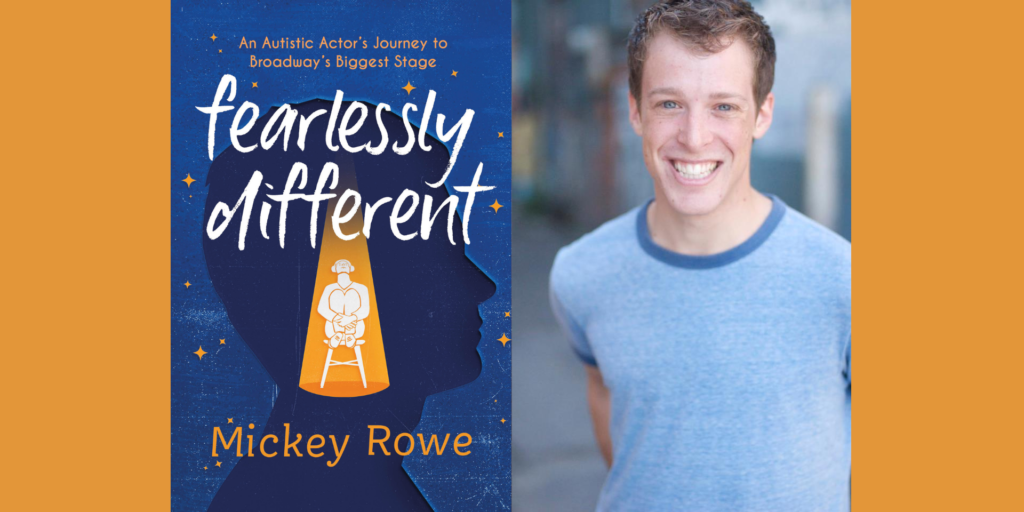
Mickey Rowe, an autistic actor, relates the ups and downs of his acting career in Fearlessly Different. Mickey grows up learning the world is a minefield for autistic people. Yet, despite all the negativity, Mickey works to make his career goals happen. Finally, Mickey gets his Big Break:
“Much like when I received my autistic diagnosis, The Curious Incident of the Dog in the Night-Time made me realize there really are other people like me out there in the world. It reminded me that I am not weird, or stupid, or bad, but just like Christopher I am powerful, and I can do whatever I want to do and accomplish the goals I want to accomplish. I read the book and knew I was not alone. I had a community. I had a people. I also knew that I needed to play this part. The show was going to be on Broadway next, in New York City. I lived in Seattle. I didn’t have an agent. But I did have three things: courage, imagination, and determination.” (p. 49)
And Mickey’s courage, imagination, and determination finally gets him the role of Christopher, an autistic character, in The Curious Incident of the Dog in the Night-Time. Although Mickey achieves success, his personal life is a train-wreck. Mickey married a woman who became increasing psychotic and abused both Mickey and their children. After The Curious Incident of the Dog in the Night-Time, Mickey still faced problems getting acting jobs because of casting directors discomfort with autistic actors. Here’s Mickey on misconceptions of autistic actors:
“They [the casting directors] often think an autistic person could never be a great actor, because we are too much like robots to convey powerful emotions onstage. This stems from the common and damaging misconception that people on the spectrum either don’t feel emotion or don’t have emotion. That’s simply not true. We feel emotions just like everyone else and can identify them within ourselves. What’s hard for us is correctly reading other people’s emotions.” (p. 97)
Reading about Mickey Rowe’s struggles broke my heart. Here is a struggling actor trying his best while almost everyone around him doubts his ability. Even more tragic is that after Mickey’s success in The Curious Incident of the Dog in the Night-Time his career stalls. Another struggle ensues and Mickey’s efforts to success continue to be tested. But, if I were a betting man, I’d put my money on Mickey Rowe. This is an inspiring story laced with sadness. GRADE: A
Our oldest daughter is on the high-functioning end of the autism spectrum. Given the challenges she has faced, she has accomplished much: she lives independently, has a job, drives, and has found her “tribe” in local community theater. Yes, she struggles with reading social cues and idiomatic language, but she is making her way in the world every day. On the surface, it seems as if she’s just living a “normal” life, but knowing what goes in to achieving that, I consider she has made a very successful life for herself.
Deb, Mickey Rowe goes into detail about trying to function socially and reading cues and using the proper language for various situations. I have nothing but respect for everyone dealing with autism successfully. And, having a great mother and father helps!
I have a friend with an autistic daughter. Getting a diagnosis was quite a long road. (She is 45). In many ways she is able to function well, but in other–like being on time for anything is beyond her. I wish she could have found “her tribe” as Deb puts it so well because she is very much alone except for her mother.
Patti, we know some couples who have autistic children who struggle to make friends. One mother confessed to me she’s living in fear of what will happen to her daughter when she and her husband are disabled…or dead.
It’s really true. There is a woman across the street from us who worked with Jackie’s sister. She had breast cancer and her husband was a cop who got sick after working at the World Trade Center site after 9/11. Their older son is brilliant but the younger one is severely autistic and non-verbal. Jackie is concerned that when they go, the brother will get the responsibility dumped on him.
Jeff, this is a common problem. Our “social safety net” is torn and tattered. Too many people fail between the cracks!
My nephew is about to turn 22. He does still live at home with my sister and her husband, but he is in college, has TWO jobs, has a number of friends, is learning to drive. We don’t know if and when he will be able to live on his own (or possibly with friends) but he has done amazing things (with the extreme help of his parents from a very young age, who got him the help he needed) and he is a lovely young man.
Jeff, the support system is key to success for people dealing with autism. I had a student on the high-functioning end of the autistic spectrum and he could do amazing things like add ten four-digit numbers in his head! The other students were plugging numbers into their calculators and this student had the correct answer…in moments! Needless to say, he scored an “A” in my Accounting I class. The average grade was a “C” after 40% of the students dropped the class because they were failing. That’s about the attrition rate for most Accounting classes.